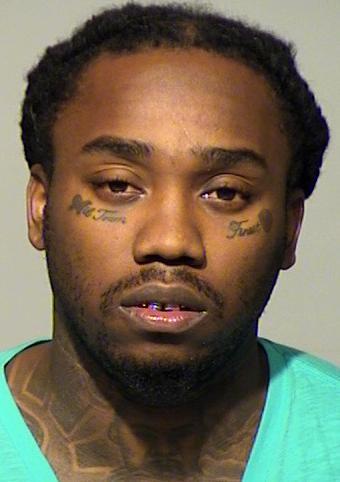MILWAUKEE — Three men are dead and a fourth shooting victim is paralyzed in a wheelchair — all from a spasm of violence prosecutors say was orchestrated by a man on trial this week in Milwaukee.
"Ladies and gentlemen, you're going to hear about something you would think only exist in a TV show like The Wire," Assistant District Attorney Grant Huebner told a jury during his opening statement late Tuesday.
"People are silenced on the thought they might cooperate" with police, he said.
Danta Rowsey is charged with killing his robbery partners, one by one, out of concern that they would turn on him. The trial promises to once again lay bare Milwaukee's growing problem of witness intimidation, or rather in this case witness elimination.
Rowsey and another man are charged in connection with a string of shootings and homicides dating back to 2011.
Rowsey, 27, faces three counts of first-degree reckless homicide in the deaths of Joseph A. McBeath Jr., Irven Hale and Israel Gatlin. All three were shot in the head at close range.
Emmanuel J. Carter, 25, pleaded guilty in February to two counts of second-degree reckless homicide, as a party to the crime, in the deaths of Hale and Gatlin.
Carter, who himself was shot, allegedly on Rowsey's order, is expected to testify against Rowsey.
Rowsey is charged with first-degree reckless injury in a September 2013 botched hit that left Carter paralyzed.
Defense attorney Mark Rosen told jurors that no physical evidence ties him to the crimes, only the words of "snitches, accomplices and liars," all desperate to sell stories to prosecutors to buy breaks in their own cases.
"Emmanuel Carter is a cold-blooded killer, who wrote rap lyrics bragging about what he did," Rosen said. "That's the kind of people they're putting up there."
According to the criminal complaint:
The string of homicides started with the fatal shooting of 26-year-old McBeath, who was found dead inside a car behind Ralph's Coffee Bar on Dec. 13, 2011. A passenger in the car also was wounded and told police that a man tapped on the window before opening fire.
Rowsey, Hale and Gatlin were all identified by Milwaukee police to be involved with that homicide through witness statements and surveillance video.
Hale was believed to be the shooter, while Gatlin was in the parking lot and Rowsey drove the getaway SUV.
On Jan. 4, 2012, just weeks after McBeath was killed, Hale was found shot to death.
An informant said Hale was shot and killed as a direct result of McBeath's killing and after Rowsey learned that Hale had gone into a nearby gas station that had surveillance video right before the shooting. By this time, Gatlin had been arrested and it was assumed that he talked to police, the informant said.
Rowsey and Carter met with other associates to devise a ruse to get an unarmed Hale into an area where he could be killed, the informant told police.
The informant recalled Rowsey saying: "Nobody is a snitch until they get an opportunity to snitch."
Hale was shot at least five times. It was unclear if Carter or Rowsey killed Hale, but both were involved, according to informants.
Gatlin was arrested 13 days after the McBeath shooting and remained in custody for several months. While in jail, he gave detectives information about the McBeath murder.
Gatlin got out of jail March 11, 2012. Six months later, he was dead.
On Oct. 1, 2012, Carter was arrested and told police that Rowsey believed Gatlin was talking to police and killed him. But an informant said Carter confessed to killing Gatlin.
Police found rap lyrics in Carter's jail cell. One line read: "Holes bigger than a hockey puck, the last (expletive) got touched was a cocky (expletive), four shots to the face."
In September 2013, Carter himself was ambushed, allegedly by Rowsey and men working for him. The shooter put a gun to his head and pulled the trigger but it did not fire. Carter was shot as he tried to run.
Rowsey arranged for Carter to be shot because he "knew too much," an informant said.
The prosecution has 300 potential witnesses in the complicated trial, which is expected to last at least two weeks.
Follow John Diedrich and Bruce Vielmetti on Twitter: @john_diedrich and @ProofHearsay

![635991971871391052-robbery.jpg [image : 84565516]](http://www.gannett-cdn.com/media/2016/05/18/USATODAY/USATODAY/635991971871391052-robbery.jpg)

